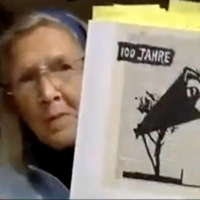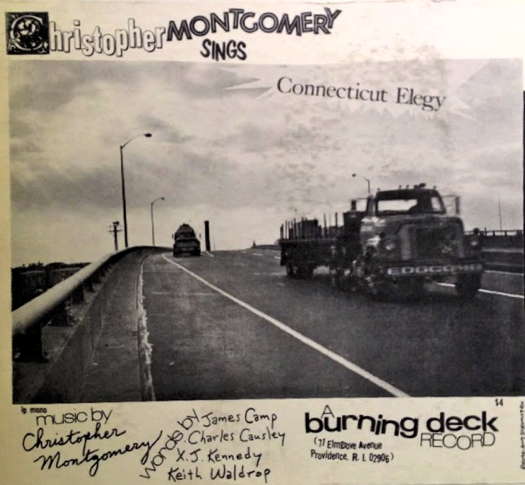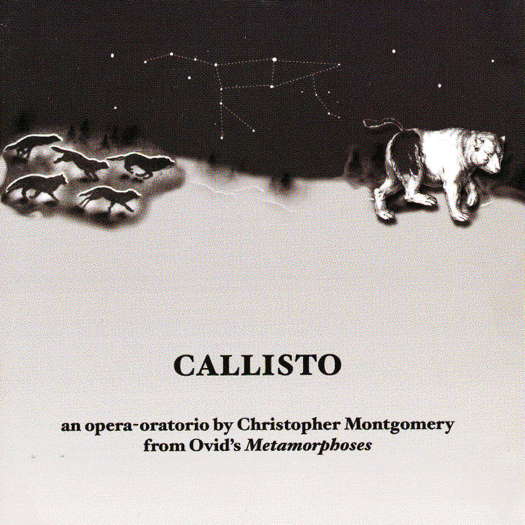- Royal Liverpool Philharmonic Orchestra
- Franz Lehár
- Mario Bernardi
- Malipiero
- Georg Johann Schinn
- Theatre Royal
- Ignaz Brüll: Piano Concerto
- Frans Vester
 SPONSORED: Ensemble. A view from the pit - John Joubert's Jane Eyre, praised by Alice McVeigh.
SPONSORED: Ensemble. A view from the pit - John Joubert's Jane Eyre, praised by Alice McVeigh.
All sponsored features >>
 VIDEO PODCAST: Discussion about Bernard Haitink (1929-2021), Salzburg, Roger Doyle's Finnegans Wake Project, the English Symphony Orchestra, the Chopin Competition Warsaw, Los Angeles Opera and other subjects.
VIDEO PODCAST: Discussion about Bernard Haitink (1929-2021), Salzburg, Roger Doyle's Finnegans Wake Project, the English Symphony Orchestra, the Chopin Competition Warsaw, Los Angeles Opera and other subjects.
Callisto
Christopher Montgomery's opera-oratorio
based on Ovid's Metamorphoses,
by ENDRE ANARU
One of the great masterpieces of Latin literature is an epic series of legends by Ovid. Ovid was a poet in Rome during the reign of Augustus, who was cast out of court for some even now unknown reason, and exiled to a barren, obscure and culturally dead city on the Black Sea. Ovid there took up the theme of transformation as the basis for his vastly important poetry. The poem has been admired ever since by Latin scholars, painters, other poets - Shakespeare seems to have cared for it greatly, by occultists (who find fragments of magical lore lurking in the text), and by mythologists who also find curious lore of pagan legend. There have been many translations of it - including one attributed to Edward de Vere by the anti-Stratfordian supporters. The Metamorphoses are a vast encyclopaedia of knowledge, wisdom and poetical beauty.
One of the legends is the sad - indeed, horrifying - tale of Callisto:
A beautiful nymph, dedicated to the virgin goddess Diana, is seen by Jupiter, ravished by the lustful God, expelled by her companions for her shame - that is not fair, terrorized by Juno, Jupiter's jealous crazed wife/consort, and after horrifying experiences hardly deserved by a young woman, is eventually transformed into ... well, no spoilers.
This work is described as an 'opera-oratorio', but for those of us who might not know, what might be the reason for the use of the two terms. An oratorio is usually a large-scale choral, orchestral narrative on religious themes, performed without costumes. The Messiah by Handel is the best example. Ovid's poem is a compendium of pagan legends, and hence counts as a religious work.
But, an opera is a different form, staged theatrically, with emphasis on the characters, their suffering - usually - and often with a romantic story. In this work, the drama is obvious, the romantic element horrifying and the characters at the mercy of forces beyond their cognizance. For these reasons, I can see why the composer conjoins the terms opera and oratorio to describe his music.
The composer writes: 'To preserve the beauty of Ovid's poem, I have chosen not to use a libretto, but to set the original language.' For a modern performance subtitles might be used, but for this recording, an English speaking narrator tells us the story.
Christopher Montgomery is an American composer, long based on the East coast in the vicinity of the two great cities there: New York and Boston. He studied with Stefan Wolpe and Roger Sessions, obtaining his graduate degree (1958) from Princeton, and so has impeccable modernist credentials.
In the late 1960s an aporia of creativity led Montgomery away from advanced music's manner and he retreated to an attic, so it is said, to create a quintessential outsider album of music: Connecticut Elegy (1971). Some of the music can be found online, revealing an unusual amalgam of serious composition, with counterculture - ie Hippie - material and method.

Listen — Christopher Montgomery: Connecticut Elegy
(extract) Performed by Christopher Montgomery. © 1971 Christopher Montgomery :
With time Montgomery returned to more strictly classical music, and though I do not have access to his later works, they apparently include many vocal and choral settings. Sadly, performances are rare, and recordings even more rare. Jeffrey Wagner has recorded an early and utterly magical set of piano works available on YouTube.
Listen — Christopher Montgomery: Flowing (Three Piano Pieces Op 1, 1957, No 1)
0:00-0:57. Jeffrey Wagner, piano. © Jeffrey Wagner :
This large scale work, Callisto (2001) - most probably Montgomery's magnum opus - is 'through composed, without arias, duets, etc, clearly set off from the recitative.' But, the influence of the Baroque and early Classical eras is evident - in some of the tonality, in some of the musical gestures, in some of the melodic lines. In this, the composer is clear that he was influenced by the practice of Stravinsky - indeed the work is dedicated to Stravinsky's memory.
Listen — Christopher Montgomery: Dance of the Stars (Callisto)
(extract from a computer realisation from the score) © 2020 Christopher Montgomery :
There are instrumental interludes (including the transformative and radiant 'Dance of the Stars') and the setting of Juno's hysterical assault upon the helpless Callisto must count as a worthy addition to the history of operatic mad scenes. Performed alone it would be a tour de force for a singer. But, here it climaxes the whole work and sets the stage for Jupiter's wise - after the fact - intervention which brings, if not peace, at least a touching poetic and cosmic transformation.

The performance is serious and fine, though sometimes marred by some unstable singing - most frequently in the ensembles, difficulty of tuning in voice and instrument, and an ideal of wobbly operatic-style vocalization that is not my preference. I would love to hear vocalists trained in Renaissance and Baroque singing perform this work, perhaps with an orchestra of period instruments - there is a harpsichord essentially playing continuo here. I think the results would be enthralling.
This work clearly deserves performances and wide recognition, as it a valuable and creative addition to the repertoire of late twentieth century choral works. The music of Christopher Montgomery fully deserves recognition, recording and publication. In a long life of creativity he has given beautiful works to our culture.
Copyright © 28 March 2020
Endre Anaru,
under quarantine in Orion, Alberta, Canada

FURTHER INFORMATION: SOMEWHAT DELAYED REVIEWS


